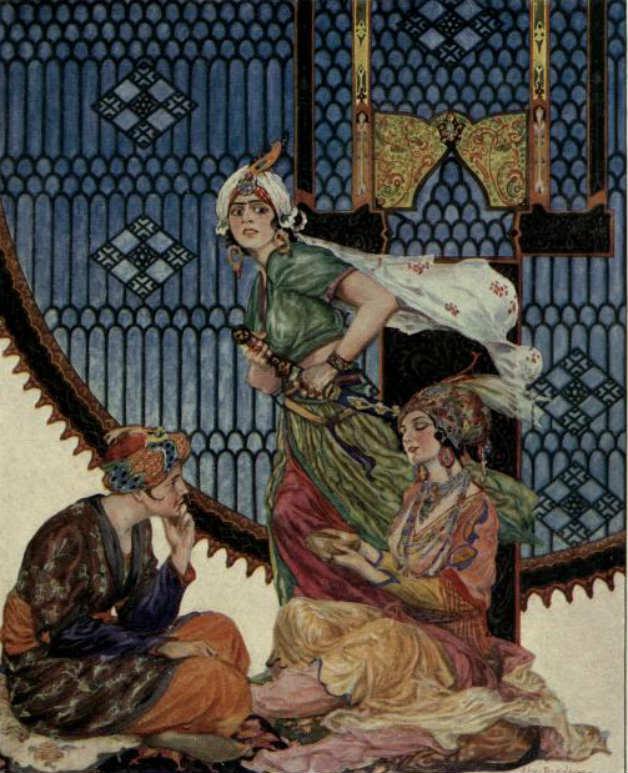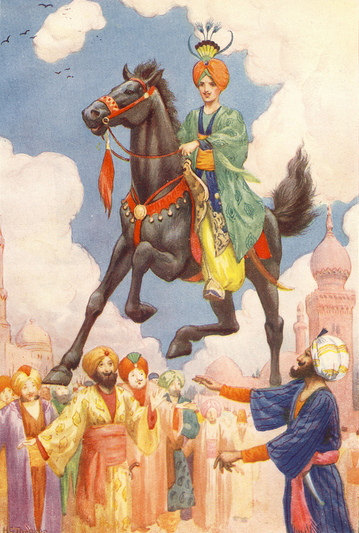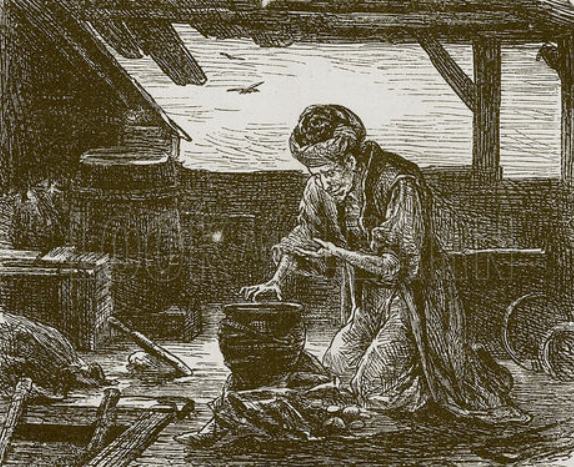Monthly Archives: August 2013
35.The Fisherman and the Jinni
There was an old, poor fisherman who cast his net four times a day and only four times. One day he went to the shore and cast his net. When he tried to pull it up, he found it to be heavy. When he dove in and pulled up the net, he found a dead donkey in it. Then he cast his net again and netted a pitcher full of dirt. Then he cast his net for a third time and netted shards of pottery and glass. On his fourth and final try, he called upon the name of God and cast his net. When he pulled it up he found a copper jar with a cap that had the seal of Solomon on it. The fisherman was overjoyed, since he could sell the jar for money. He was curious of what was inside the jar, and removed the cap with his knife. A plume of smoke came out of the jar and condensed into an Ifrit (powerful Jinni). The fisherman was frightened, although initially the Jinni did not notice him. The Jinni thought that Solomon had come to kill him. When the fisherman told him that Solomon had been dead for many centuries, the Jinni was overjoyed and granted the fisherman a choice of the manner of his death. *****
34.The Story of Two Sisters Who Were Jealous of Their Younger Sister
Once upon a time there reigned over Persia a Sultan named Kosrouschah, who from his boyhood had been fond of putting on a disguise and seeking adventures in all parts of the city, accompanied by one of his officers, disguised like himself. And no sooner was his father buried and the ceremonies over that marked his accession to the throne, than the young man hastened to throw off his robes of state, and calling to his vizir to make ready likewise, stole out in the simple dress of a private citizen into the less known streets of the capital.
Passing down a lonely street, the Sultan heard women’s voices in loud discussion; and peeping through a crack in the door, he saw three sisters, sitting on a sofa in a large hall, talking in a very lively and earnest manner. Judging from the few words that reached his ear, they were each explaining what sort of men they wished to marry.
“I ask nothing better,” cried the eldest, “than to have the Sultan’s baker for a husband. Think of being able to eat as much as one wanted, of that delicious bread that is baked for his Highness alone! Let us see if your wish is as good as mine.”
“I,” replied the second sister, “should be quite content with the Sultan’s head cook. What delicate stews I should feast upon! And, as I am persuaded that the Sultan’s bread is used all through the palace, I should have that into the bargain. You see, my dear sister, my taste is as good as yours.”
It was now the turn of the youngest sister, who was by far the most beautiful of the three, and had, besides, more sense than the other two. “As for me,” she said, “I should take a higher flight; and if we are to wish for husbands, nothing less than the Sultan himself will do for me.”
33.The Enchanted Horse
It was the Feast of the New Year, the oldest and most splendid of all the feasts in the Kingdom of Persia, and the day had been spent by the king in the city of Schiraz, taking part in the magnificent spectacles prepared by his subjects to do honor to the festival. The sun was setting, and the monarch was about to give his court the signal to retire, when suddenly an Indian appeared before his throne, leading a horse richly harnessed, and looking in every respect exactly likes a real one.
“Sire,” said he, prostrating himself as he spoke, “although I make my appearance so late before your Highness, I can confidently assure you that none of the wonders you have seen during the day can be compared to this horse, if you will deign to cast your eyes upon him.” ******
32.The Story of Ali Cogia, Merchant of Baghdad
In the reign of Haroun-al-Raschid, there lived in Baghdad a merchant named Ali Cogia, who, having neither wife nor child, contented himself with the modest profits produced by his trade. He had spent some years quite happily in the house his father had left him, when three nights running he dreamed that an old man had appeared to him, and reproached him for having neglected the duty of a good Mussulman, in delaying so long his pilgrimage to Mecca.
Ali Cogia was much troubled by this dream, as he was unwilling to give up his shop, and lose all his customers. He had shut his eyes for some time to the necessity of performing this pilgrimage, and tried to atone to his conscience by an extra number of good works, but the dream seemed to him a direct warning, and he resolved to put the journey off no longer.*****





